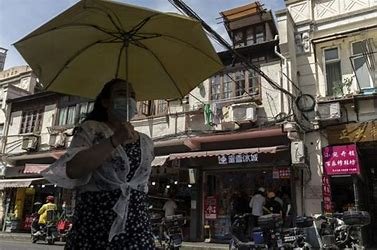A scorching heatwave has engulfed parts of Delhi, leaving residents and infrastructure grappling with the sweltering conditions. On Monday, maximum temperatures soared beyond the 46-degree mark, straining power grids and posing significant challenges to outdoor laborers, homeless individuals, and even animals.
The India Meteorological Department (IMD) issued a prediction, stating that similar oppressive conditions would persist until relief arrives in the form of rain from Wednesday onwards. The Safdarjung Observatory, Delhi’s primary weather station, recorded a staggering maximum temperature of 43.7 degrees Celsius—four notches above normal and the highest so far this year.
Najafgarh, located in the capital, experienced even more extreme heat, with the mercury reaching a scalding 46.2 degrees Celsius, making it the hottest spot in Delhi. Other areas, such as Narela, Pitampura, and Pusa, also reported heatwave conditions, with temperatures ranging from 45.3 to 45.8 degrees Celsius.
The criteria for a heatwave are met when a station’s maximum temperature reaches a minimum of 40 degrees Celsius in the plains, 37 degrees Celsius in coastal areas, or 30 degrees Celsius in hilly regions, with a departure from normal of at least 4.5 degrees Celsius.
To provide a glimmer of hope, the IMD mentioned an active western disturbance over the western Himalayan region that would bring rain, hailstorms, and gusty winds to the northwestern plains starting Wednesday. As a result, the maximum temperature is expected to drop to 36 degrees Celsius by Thursday.
Interestingly, earlier this month, the Meteorological Office had predicted below-normal maximum temperatures and fewer heatwave days in northwest India for May. However, the current heatwave has defied those expectations, subjecting Delhi to an intense heat spell.
As temperatures soared, so did the demand for electricity in the city. Officials reported a peak power demand of 6,532 MW around 3:30 pm, a significant increase from the 6,011 MW recorded around 11:30 pm the previous day. Last summer, Delhi’s peak power demand reached 7,695 MW, and this year it may even reach 8,100 MW, highlighting the strain on the power infrastructure.
Delhiites are eagerly anticipating the arrival of rain to bring relief from the blistering heat. Until then, residents are advised to take necessary precautions, stay hydrated, and minimize exposure to the scorching sun. The city’s power grids continue to face the challenge of meeting the surging electricity demand amidst the relentless heatwave.

